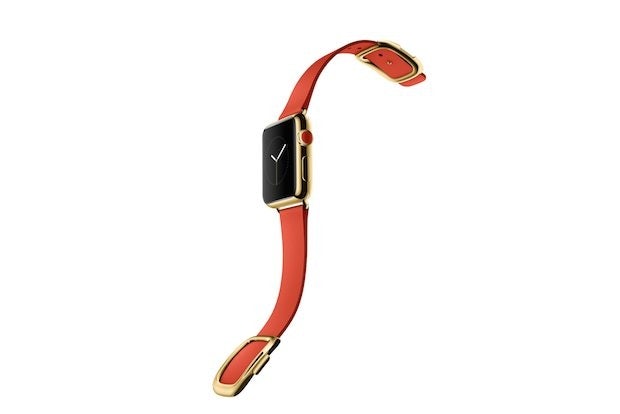
A piece from Apple Watch's luxury Edition collection. (Courtesy Photo)
With sales in the last quarter of 2014 jumping 70 percent year-on-year to $16 billion and the iPhone 6 taking the helm as the best selling smartphone in the three months leading to January 2015, Apple is clearly on a roll in China. But with the impending launch of the new Apple Watch, entering the market at a time when most high-priced watchmakers are facing unprecedented headwinds, the question becomes: will the Apple Watch see the same success as the iPhone or MacBook in China?
Before the device even goes on sale, one thing that is certain is that Apple definitely aims to make it easier to purchase. The watch will go on sale in China next month on Apple’s Tmall flagship, in addition to the official Apple China website and monobrand stores. If previous product launches are any indication, however, expect to see a significant number of buyers and aspiring gray-market vendors lining up at Apple stores in New York, Paris, Tokyo, and Hong Kong. Ranging in price from $349 to well over $10,000 in the United States, the cheapest Apple Watch will—according to Reuters—cost an estimated $479 in China.
In addition to being sold on Tmall, another nod to the China market seen on the Apple Watch is WeChat integration, allowing wearers to send and receive WeChat messages.
However, the success of the Apple Watch is by no means guaranteed in China. From the small size of the screen and the price—comparable to entry-level Swiss brands like Tissot—achieving widespread sales to China’s middle class might be a challenge. One reason is because some of the functions considered most interesting by Western consumers—among them the health-monitoring apps—are often associated with cheaper, simpler products. As Bryan Wang of Forrester Research told Reuters this week, “For health-related products in China, most consumers buy them because they’re cheap…How many are buying those? Not many.”
The Apple Watch also enters the China market at a time when high-priced watches are verboten among the bureaucratic elite that was—just a few short year ago—one of the most rabid watch-buying demographics in the world. Now, Apple can expect to sell relatively few of its highest-priced rose gold models within mainland China— the majority of buyers of these models will likely purchase abroad, as they do everything from Hermès bags to luxury real estate.
Inside mainland China, we can expect to see the greatest success for the Apple Watch to come from upper-middle-class urbanites, to whom Apple products are an integral part of their lifestyle and to whom health and messaging functionality fit in with hectic schedules. Among this demographic, it’s likely that Apple’s “standard” version (priced from $549 to $1,099 in the United States) will see the highest sales, although younger, more fitness-minded consumers will likely opt for the Sport model.
That said, there is a certain type of flashy, affluent buyer in China, largely derived from the country’s “post-90s” generation, that will likely jump on the Apple Watch, seeing it as the latest must-have status symbol. Unlike the Rolex-happy bureaucrats of 2011-2012, this consumer sees tech products as more disposable, worrying little about technical obsolescence and more about impressing their fuerdai peers. Apple may see surprisingly high sales to this demographic, even for its most expensive Apple Watch models.
Avery Booker is a partner at China Luxury Advisors.
